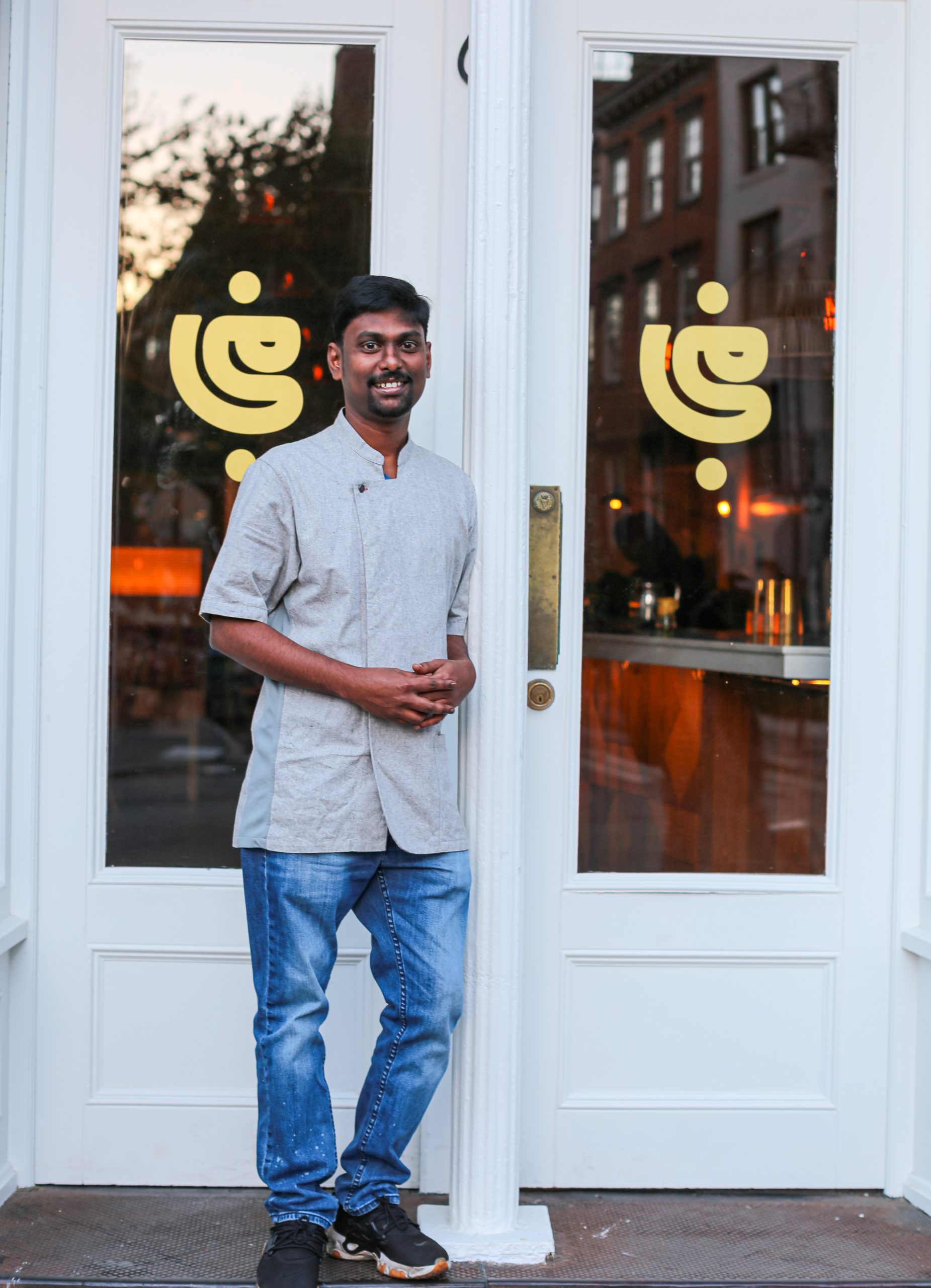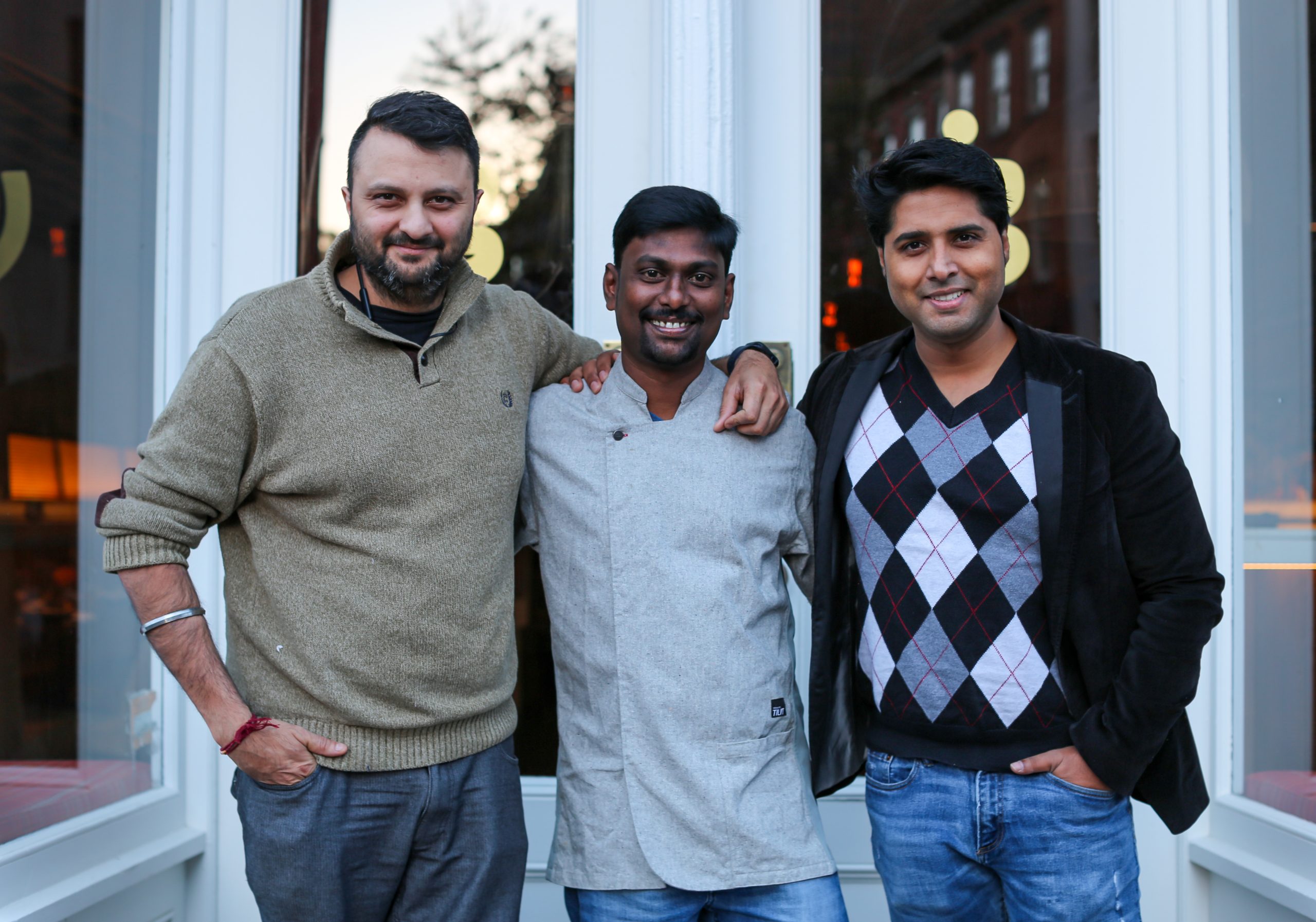From cocktails with cardamoms and curry leaves to goat intestines and snails, what makes the menu at Semma such a hit that there are at least 1400 people on the waiting list for a reservation every day!
(August 20, 2023) Chef Vijay Kumar’s career trajectory seems like a culinary fairy tale. After a three-year diploma in hotel management from the State Institute of Hotel Management in Trichy, Tamil Nadu, campus recruitment landed him a job at the Taj Group of Hotels, specifically, the Taj Connemara in Chennai.
Three years later, he joined a cruise liner and another three years after, came to the US where he worked in California. First, at a restaurant called Dosa in San Francisco, followed by Rasa in Burlingame, cooking Indian food with a modern twist.

Staying true to his roots
Chef Vijay Kumar, in an exclusive with Global Indian reveals, “Though I was happy with what I was doing in the cruise liners, I didn’t feel creatively fulfilled. I didn’t see why I had to fit in and confine myself to someone else’s idea of what Indian food should taste like. I wanted to showcase my cuisine and culture as I knew it; cook real authentic food; the kind I grew up eating in my hometown of Natham near Dindigul, and at my grandparents’ home.”
The universe along with Chef Chintan Pandya and Roni Mazumdar of Unapologetic Foods, seemed to have heard his wish to cook authentic Indian food when they met in New York in 2021. Their pre-existing restaurant Raahi, metamorphosed into Semma, which means excellent or superb in Tamil.
With the freedom to cook the food he knew best; Vijay replicated his grandmother’s recipes at Semma. Goat’s intestines, given for free by the local butcher on buying mutton; and snails, which he and his siblings would collect from the paddy fields, found their way into a menu in New York City. He recreates the history and adventure surrounding nathai, snails cooked with onion, tomato and tamarind. “During the holidays, my mother used to take us to our grandparents’ village. They had no electricity in the village and no local transport. So, we would get off the bus near Madurai and walk three or four km to their house. With no entertainment available, my grandmother used to take us to the paddy fields to collect snails. It was an adventure for my brothers, sister and me. She would then cook the snails in a clay pot in a rich, spicy gravy. I cook it the same way and serve it to my guests along with a kal dosa, where kal is the Tamil word for the tawa we cook the dosa on.”

Chef Chintan Pandya with Chef Vijay Kumar and Roni Mazumdar
Another Semma favourite that is consistently relished, and lavished with praise in local media is the humble masala dosa, here named the Gunpowder Dosa. The dosa, generously doused with pure ghee, gunpowder, and the potato masala, is served with two chutneys and the piece de resistance – an integral part of this dish – sambar. Except that Vijay’s sambar is made with a whopping 50 ingredients! Food reviews including those in the New York Times write eulogies in praise of his creation, reiterating that it is unlike any other ubiquitous version of the dish.
Making Semma a sensation
The menu at Semma is inherently South Indian, with a generous use of spices, some not even well-known. Poriyals, paniyarams – served with paati’s chutney, Attukari Sukka – a lamb dish made with mace and pepper from Telicherry, Chettinadu Maan – venison with star anise and black stone flower – a lichen also known as dagad phool (kal pasi in Tamil) which adds a certain fragrance to a dish; and, Kudal Varuval – a dry curry made with goat’s intestines. “We use regional spices like kal pasi and marathi moggu – a spice similar to a clove that adds an amazing flavour to the dish Chettinadu Maan.”
View this post on Instagram
The star of the menu, however, is the Dindigul Goat Biryani – made with seeraga samba rice – a short grain rice grown in specific regions of Tamil Nadu. It has patrons who dine at the far end of the evening annoyed when the dish is unavailable. Vijay says, “I have guests asking, how can you say you don’t have the biryani, why don’t you make more of it? We cook every dish from scratch – from toasting the masalas to making the gravies – everything is made fresh every day.”
The cocktails, though created by a bar team, also reflect the regional flavour. The names were the creation of the Unapologetic Foods team – Whistle Podu, a gin-based cocktail with curry leaves, Konkan Jaadu – a tequila drink with kokum extract, and Pondicherry Sarakku, made with Hennessy, gooseberry shrub, ginger, tulsi and lemon. The drinks are served in tiny clay pots, colloquially known as kulhads in India.
Semma, echoing the philosophy of the company, proudly retains its originality and is truly unapologetic about its spice quotient. The entire range of masalas, little known spices and additional ingredients all proudly announce their presence.
View this post on Instagram
Copious amounts of curry leaves and cilantro are also used; these two are Vijay’s favourite ingredients that he loves to use in all his dishes. He cooks the food he ate as a child; and no, he hasn’t dulled the chilli with butter or cream. He says, “When I first moved to the US, my friends and family would make fun of me saying I am still making idlis and dosas. But I believe we Indians underestimate our own cuisine; I wanted to break this barrier and misconception that South Indian food is only idlis and dosas. It is so much more; even regions within each state cook food differently.”
Accolades and patrons
Well, it was this difference, and being true to his roots, that led to Semma and Vijay and his team winning a Michelin star within one year of Semma’s launch. Considered the most prestigious honour in the hospitality arena, Vijay adds with justifiable pride, “Semma is the only Indian restaurant in the entire United States, with a Michelin star this year.”
This pride spills over to his patrons as well. Indian Americans who dine here, and some who bring their parents along, get nostalgic when they eat the food he serves. Chef Vijay Kumar reveals, “They get very emotional; some of them ask to meet me and bless me. Mostly, they say it reminds them of the food they ate back home as children.” He adds that he was hesitant when he started and never expected the reception his cooking has received. “I am pleasantly surprised and feel blessed that people are loving what we serve. I think the credit goes to Chintan and Roni for really changing the game and inspiring a lot of people to cook unapologetically.”
View this post on Instagram
Almost two years old now, the response to the food continues to be overwhelming. Semma opens reservations a month in advance, and the tables get booked out within minutes. There is a notification or waiting list of at least 1500 people every day and they can book a table in case of a cancellation. It is only open for dinner and they serve approximately 230 people in one evening.
The secret perhaps to Semma’s popularity and success is Vijay’s admission that he cooks from the heart. He also believes it will be the next worldwide trend. “Micro-regional cooking, going back to what your ancestors ate without changing the dish to please others, is the next big trend. Also, using clay pots, banana leaves, bamboo, to cook and serve, and other sustainable practices will become global preferences.”
And while a cookbook may still be far into the future for now, this 42-year-old chef, who will not eat Indian food on his day off, preferring to sample world cuisines instead, plans to continue wowing Americans with food his grandmother cooked, perhaps with recipes as ancient as her own ancestors.
Chef Vijay Kumar likes to dine at:
For Italian: Don Angie, it is right next door to us and I love the place
Pan-Asian: Thai Diner
Indian: I won’t eat Indian food on my day off. I like to try other cuisines
- Follow Chef Vijay Kumar on Instagram




